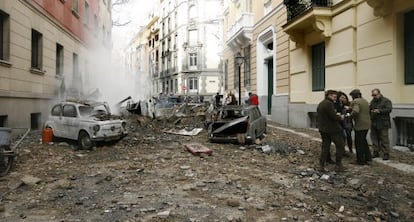Madrid turns its back on the movies
The organization responsible for attracting film shoots to the capital is on the verge of closure

Three-and-a-half years ago Hollywood stars Bruce Willis and Sigourney Weaver shot the film The Cold Light of Day in Madrid. Slated by the critics – The New York Times called it a “catastrophe” – and ignored by the public (it cost €21 million and took in just €14 million) – the production nevertheless left millions of euros in the Spanish capital and, presumably, promoted its image around the world.
The film was one of 47 productions, which also included hit Spanish comedy Torrente 4 and Pedro Almodóvar’s The Skin I Live I, registered by the Madrid Film Commission in the city in 2011. Created a decade ago to turn the capital’s streets into an international showcase through cinema, the organization is now on the verge of closure as a result of public spending cuts and lack of private financing.
The commission was set up in January 2004 with the aim of reproducing the effect that productions such as The Lord of Rings saga had on the tourism industry in New Zealand. Its economic premise is clear: approximately a third of a production’s budget stays in the host city.
Among the free services it offers are the processing of filming permits for movie, TV and advertising shoots; help in scouting locations (it has a database of photos on its website); and the attracting of international productions to the capital. To carry out this last task it has signed agreements with sister institutions in Berlin, Paris and Rome, and attends, among other events, the Berlin, Cannes and San Sebastián Film Festivals.
It was set up with the aim of reproducing the effect that ‘The Lord of Rings’ saga had on New Zealand tourism
In 2013 it advised on 132 projects (114 of them Spanish and 18 foreign) and sorted out 1,538 filming permits (500 of them for international productions) and 146 locations (48 for foreign shoots). On the board of the commission sit the Madrid regional and municipal governments; the association of employers and the Madrid Chamber of Commerce; the Fapae association of Spanish producers and the Egeda audiovisual rights management agency.
This year the Madrid regional government, which is run by the conservative Popular Party (PP), plans to give it a subsidy of €30,000. Meanwhile the city government, which is also PP run and handed over €50,000 in 2010, is unable to give it a cent, according to regional government and corporate sources. The rest of the budget is set to be covered by producers.
When it started, the commission had available funds of €600,000, but now the figure is not even a third of that. In December it let go of one of its three employees and the two left are barely able to cope with the daily volume of work.
But the worst is yet to come: the producers claim that their funds for the commission came predominantly from the so-called “digital canon,” which levied a fee on equipment capable of making digital copies of content (such as CD and DVD recorders and MP3-enabled cellphones). The government eliminated this in 2012 and producers say they no longer have the cash to cover the Madrid Film Commission budget, especially now the contribution from the public sector has been reduced to almost nothing as a result of the crisis.
This year the Madrid municipal government is unable to give the commission a cent, say sources
The regional government admits it is worried about the situation. Several board members have advocated freezing the commission’s activity until its financial problems are solved so as to stop the debts from piling up. Back in April Madrid regional premier Ignacio González announced his intention to turn Madrid into “a great big film set,” by giving breaks on municipal and state taxes to film shoots. But at the commission’s board meeting on Monday – which the Madrid city government did not attend – the deputy head of the regional culture and tourism department, Carmen González Fernández, had to provide an emergency stopgap to prevent the body’s closure. On the one hand, she promised that the regional budget for 2015 would cover the commission’s needs. On the other, to cover the international events planned for this year, she offered additional funds from tourism. But for that, she is demanding “a concrete action plan that clearly sets out the producers with whom they are going to hold meetings and the festivals to which they are going,” according to regional sources.
“It would be a mistake for the capital to do away with the Madrid Film Commission or to let it die out because of a lack of funds,” said Hilario Alfaro, president of the Trade Confederation. “From the business world, we ask the regional and municipal government for an effort to maintain this tool, given that it is proven that film is the best way of promoting a city.”
Tu suscripción se está usando en otro dispositivo
¿Quieres añadir otro usuario a tu suscripción?
Si continúas leyendo en este dispositivo, no se podrá leer en el otro.
FlechaTu suscripción se está usando en otro dispositivo y solo puedes acceder a EL PAÍS desde un dispositivo a la vez.
Si quieres compartir tu cuenta, cambia tu suscripción a la modalidad Premium, así podrás añadir otro usuario. Cada uno accederá con su propia cuenta de email, lo que os permitirá personalizar vuestra experiencia en EL PAÍS.
¿Tienes una suscripción de empresa? Accede aquí para contratar más cuentas.
En el caso de no saber quién está usando tu cuenta, te recomendamos cambiar tu contraseña aquí.
Si decides continuar compartiendo tu cuenta, este mensaje se mostrará en tu dispositivo y en el de la otra persona que está usando tu cuenta de forma indefinida, afectando a tu experiencia de lectura. Puedes consultar aquí los términos y condiciones de la suscripción digital.








































